Question Number 109855 by aurpeyz last updated on 26/Aug/20
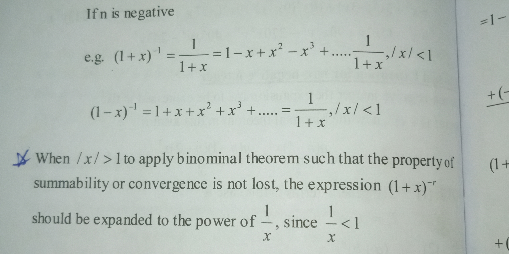
Answered by aurpeyz last updated on 26/Aug/20

$${Can}\:{anyone}\:{pls}\:{explain}\:{this}?\:{it}\:{is}\:{pertaining} \\ $$$${binomial}\:{expansion}\:{for}\:{negative}\:{powers} \\ $$
Commented by mathdave last updated on 26/Aug/20

$${either}\:{for}\:{positive}\:{or}\:{negative}\:{degree}\:{power} \\ $$$${always}\:{use}\:{this}\:{generalization}\:{formular} \\ $$$$\left({x}+{y}\right)^{{n}} =\frac{{x}^{{n}} }{\mathrm{0}!}+\frac{{nx}^{{n}−\mathrm{1}} {y}}{\mathrm{1}!}+\frac{{n}\left({n}−\mathrm{1}\right){x}^{{n}−\mathrm{2}} {y}^{\mathrm{2}} }{\mathrm{2}!}+\frac{{n}\left({n}−\mathrm{1}\right)\left({n}−\mathrm{2}\right){x}^{{n}−\mathrm{3}} {y}^{\mathrm{3}} }{\mathrm{3}!}………. \\ $$
Answered by Her_Majesty last updated on 26/Aug/20
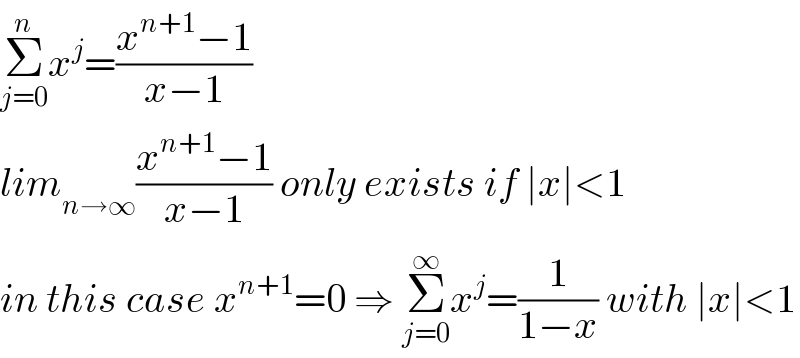
$$\underset{{j}=\mathrm{0}} {\overset{{n}} {\sum}}{x}^{{j}} =\frac{{x}^{{n}+\mathrm{1}} −\mathrm{1}}{{x}−\mathrm{1}} \\ $$$${lim}_{{n}\rightarrow\infty} \frac{{x}^{{n}+\mathrm{1}} −\mathrm{1}}{{x}−\mathrm{1}}\:{only}\:{exists}\:{if}\:\mid{x}\mid<\mathrm{1} \\ $$$${in}\:{this}\:{case}\:{x}^{{n}+\mathrm{1}} =\mathrm{0}\:\Rightarrow\:\underset{{j}=\mathrm{0}} {\overset{\infty} {\sum}}{x}^{{j}} =\frac{\mathrm{1}}{\mathrm{1}−{x}}\:{with}\:\mid{x}\mid<\mathrm{1} \\ $$
Answered by Rio Michael last updated on 26/Aug/20
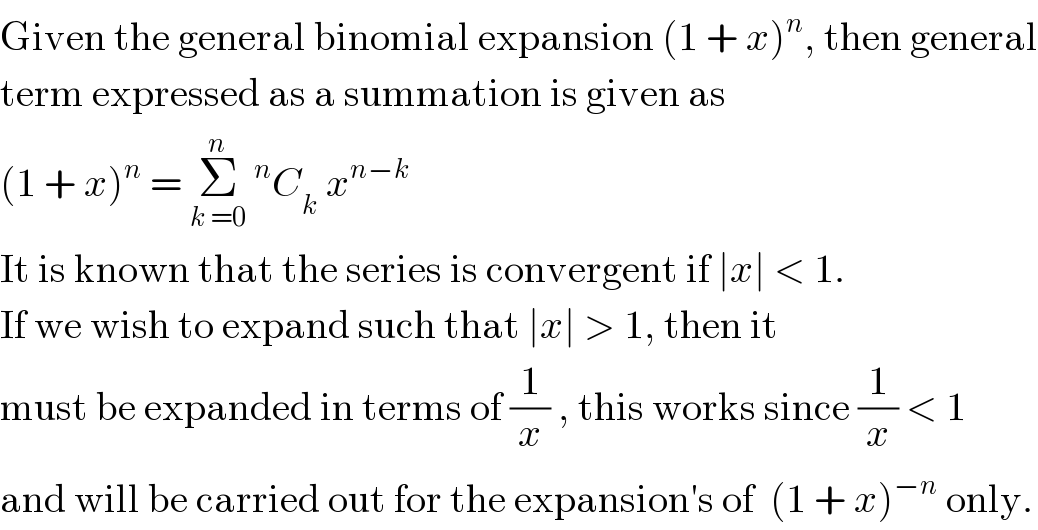
$$\mathrm{Given}\:\mathrm{the}\:\mathrm{general}\:\mathrm{binomial}\:\mathrm{expansion}\:\left(\mathrm{1}\:+\:{x}\right)^{{n}} ,\:\mathrm{then}\:\mathrm{general} \\ $$$$\mathrm{term}\:\mathrm{expressed}\:\mathrm{as}\:\mathrm{a}\:\mathrm{summation}\:\mathrm{is}\:\mathrm{given}\:\mathrm{as} \\ $$$$\left(\mathrm{1}\:+\:{x}\right)^{{n}} \:=\:\underset{{k}\:=\mathrm{0}} {\overset{{n}} {\sum}}\:^{{n}} {C}_{{k}} \:{x}^{{n}−{k}} \\ $$$$\mathrm{It}\:\mathrm{is}\:\mathrm{known}\:\mathrm{that}\:\mathrm{the}\:\mathrm{series}\:\mathrm{is}\:\mathrm{convergent}\:\mathrm{if}\:\mid{x}\mid\:<\:\mathrm{1}. \\ $$$$\mathrm{If}\:\mathrm{we}\:\mathrm{wish}\:\mathrm{to}\:\mathrm{expand}\:\mathrm{such}\:\mathrm{that}\:\mid{x}\mid\:>\:\mathrm{1},\:\mathrm{then}\:\mathrm{it} \\ $$$$\mathrm{must}\:\mathrm{be}\:\mathrm{expanded}\:\mathrm{in}\:\mathrm{terms}\:\mathrm{of}\:\frac{\mathrm{1}}{{x}}\:,\:\mathrm{this}\:\mathrm{works}\:\mathrm{since}\:\frac{\mathrm{1}}{{x}}\:<\:\mathrm{1} \\ $$$$\mathrm{and}\:\mathrm{will}\:\mathrm{be}\:\mathrm{carried}\:\mathrm{out}\:\mathrm{for}\:\mathrm{the}\:\mathrm{expansion}'\mathrm{s}\:\mathrm{of}\:\:\left(\mathrm{1}\:+\:{x}\right)^{−{n}} \:\mathrm{only}. \\ $$
Commented by aurpeyz last updated on 26/Aug/20
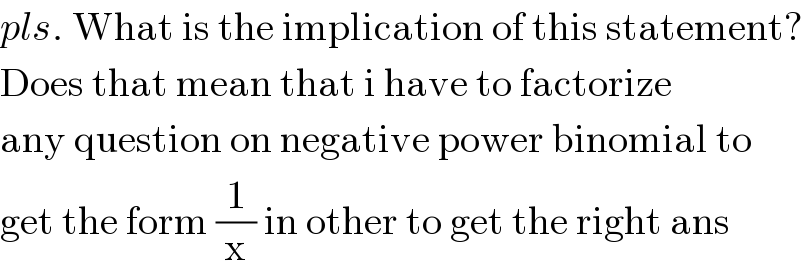
$${pls}.\:\mathrm{What}\:\mathrm{is}\:\mathrm{the}\:\mathrm{implication}\:\mathrm{of}\:\mathrm{this}\:\mathrm{statement}? \\ $$$$\mathrm{Does}\:\mathrm{that}\:\mathrm{mean}\:\mathrm{that}\:\mathrm{i}\:\mathrm{have}\:\mathrm{to}\:\mathrm{factorize} \\ $$$$\mathrm{any}\:\mathrm{question}\:\mathrm{on}\:\mathrm{negative}\:\mathrm{power}\:\mathrm{binomial}\:\mathrm{to} \\ $$$$\mathrm{get}\:\mathrm{the}\:\mathrm{form}\:\frac{\mathrm{1}}{\mathrm{x}}\:\mathrm{in}\:\mathrm{other}\:\mathrm{to}\:\mathrm{get}\:\mathrm{the}\:\mathrm{right}\:\mathrm{ans} \\ $$
Commented by aurpeyz last updated on 26/Aug/20
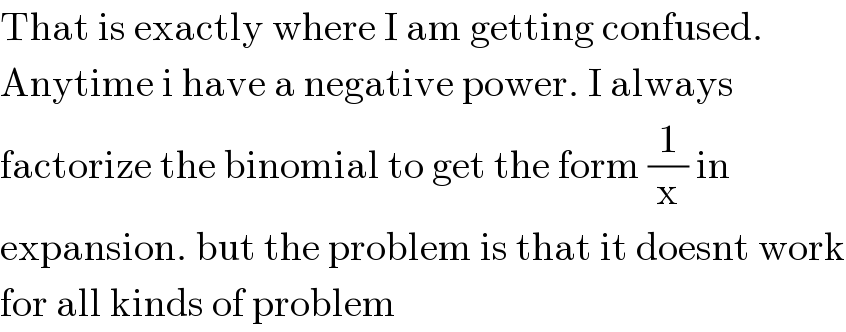
$$\mathrm{That}\:\mathrm{is}\:\mathrm{exactly}\:\mathrm{where}\:\mathrm{I}\:\mathrm{am}\:\mathrm{getting}\:\mathrm{confused}. \\ $$$$\mathrm{Anytime}\:\mathrm{i}\:\mathrm{have}\:\mathrm{a}\:\mathrm{negative}\:\mathrm{power}.\:\mathrm{I}\:\mathrm{always} \\ $$$$\mathrm{factorize}\:\mathrm{the}\:\mathrm{binomial}\:\mathrm{to}\:\mathrm{get}\:\mathrm{the}\:\mathrm{form}\:\frac{\mathrm{1}}{\mathrm{x}}\:\mathrm{in}\: \\ $$$$\mathrm{expansion}.\:\mathrm{but}\:\mathrm{the}\:\mathrm{problem}\:\mathrm{is}\:\mathrm{that}\:\mathrm{it}\:\mathrm{doesnt}\:\mathrm{work} \\ $$$$\mathrm{for}\:\mathrm{all}\:\mathrm{kinds}\:\mathrm{of}\:\mathrm{problem} \\ $$
Commented by Rio Michael last updated on 26/Aug/20

$$\:\mathrm{No}\:\mathrm{its}\:\mathrm{expansion}\:\mathrm{as}\:\mathrm{you}\:\mathrm{would}\:\mathrm{for}\:\mathrm{anyother}\:\mathrm{problem}. \\ $$$$\mathrm{Most}\:\mathrm{at}\:\mathrm{times}\:\mathrm{it}\:\mathrm{will}\:\mathrm{appear}\:\mathrm{in}\:\mathrm{terms}\:\mathrm{of}\:\frac{\mathrm{1}}{{x}}\:,\:\mathrm{if}\:\mathrm{it}\:\mathrm{doesn}'\mathrm{t} \\ $$$$\mathrm{then}\:\mathrm{either}\:\mathrm{the}\:\mathrm{series}\:\mathrm{doesn}'\mathrm{t}\:\mathrm{converge}\:\mathrm{or}\:\mathrm{it}'\mathrm{s}\:\mathrm{got}\:\mathrm{a}\:\mathrm{particular} \\ $$$$\mathrm{range}\:\mathrm{of}\:\mathrm{numbers}\:\mathrm{for}\:\mathrm{which}\:\mathrm{it}\:\mathrm{converges}. \\ $$
Commented by aurpeyz last updated on 27/Aug/20

$${Sir}.\:{Pls}\:{check}\:{question}\:{Q}.\mathrm{110109}\:{help}\:{me}\:{with}\:{the}\:{expansion} \\ $$
